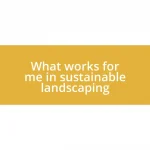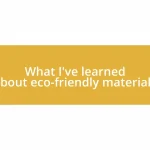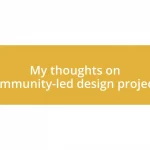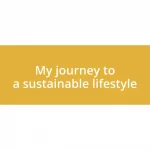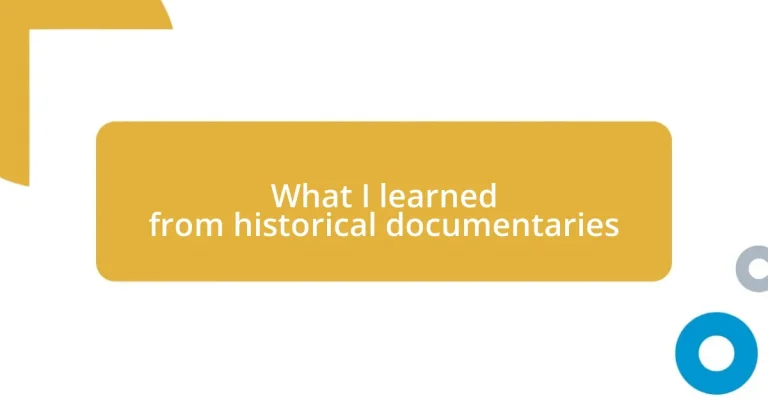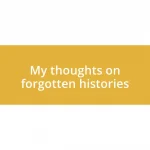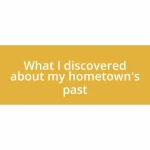Key takeaways:
- Historical documentaries bridge the past and present, evoking empathy and promoting reflection on societal issues.
- Key lessons from history include resilience, the importance of empathy, and learning from past injustices to shape a better future.
- Critical thinking in analyzing documentaries involves questioning perspectives, distinguishing fact from interpretation, and connecting personal experiences to historical narratives.
- Incorporating historical lessons into daily life encourages advocacy for social justice and fosters meaningful conversations to create positive change.
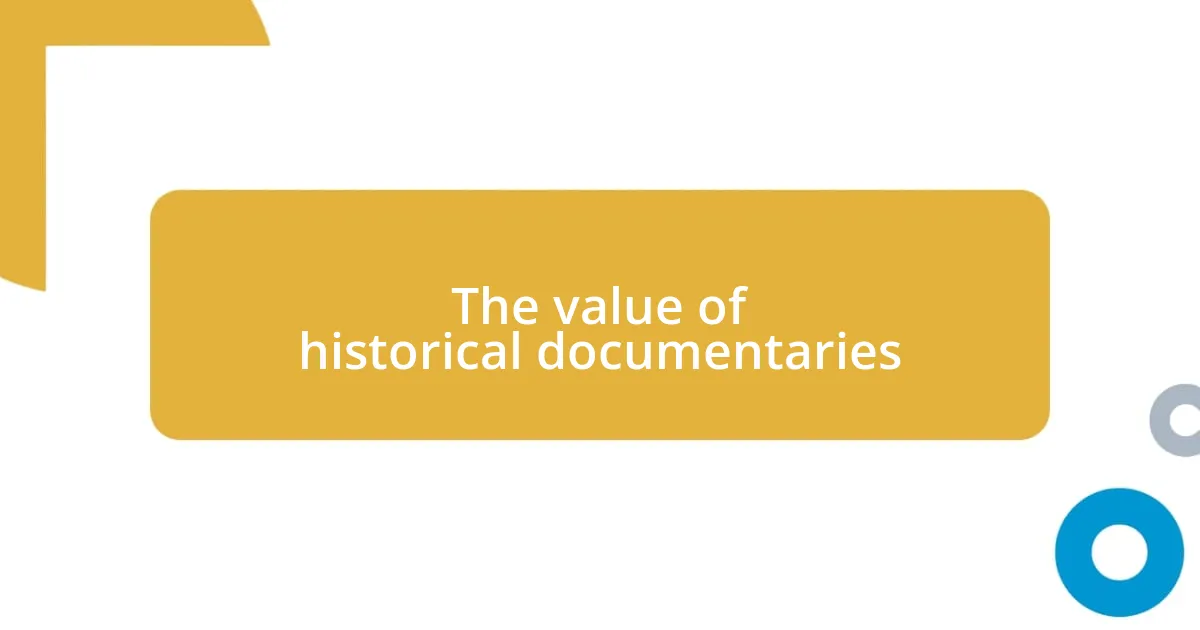
The value of historical documentaries
Historical documentaries hold immense educational value, serving as a bridge to our past. I remember feeling a rush of excitement the first time I watched a documentary about World War II. It wasn’t just information on a screen; it felt like a window into a different world, sparking my curiosity and leading me to read more about the events that shaped our history.
These documentaries do more than just present facts; they evoke emotions and help us connect with the experiences of others. For example, when I watched one that focused on personal testimonies from Holocaust survivors, I couldn’t help but feel a profound sense of empathy. It made me realize how essential it is to remember these stories. Isn’t it crucial that we understand the human side of historical events?
Moreover, they challenge us to reflect on our current society. When I see parallels between past injustices and present-day issues in documentaries, I often ask myself: What can we learn from these experiences? It becomes evident that understanding history isn’t just about knowing dates or events; it’s about applying those lessons to create a better future.
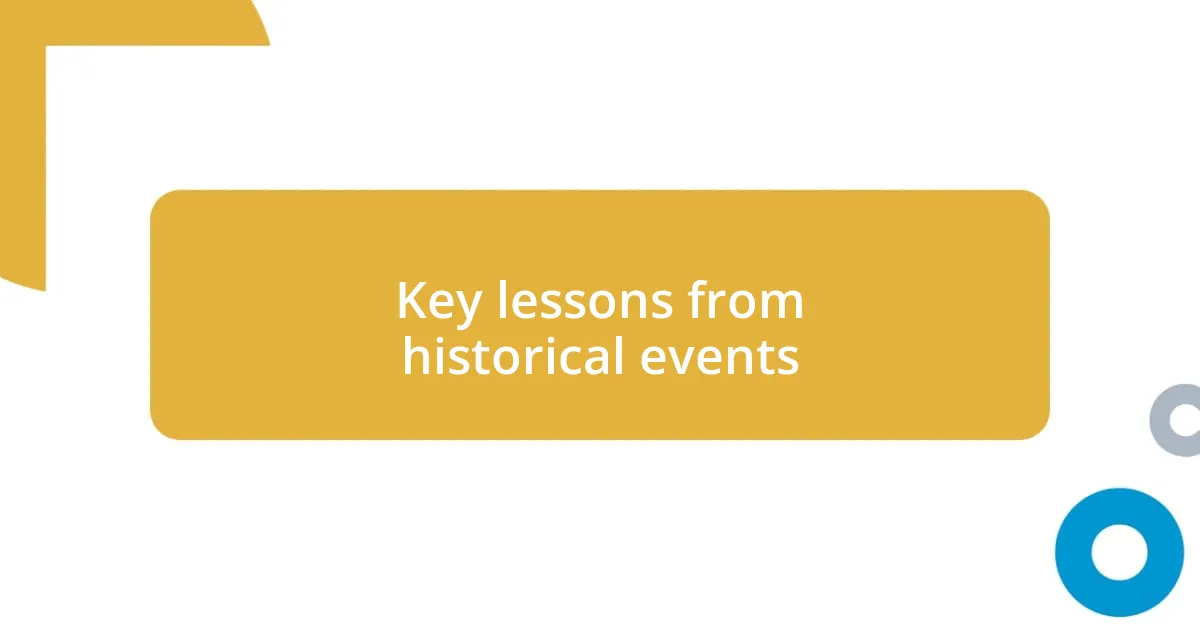
Key lessons from historical events
Key lessons from historical events reveal profound truths that resonate through time. Watching documentaries about the civil rights movement truly struck a chord with me. I remember feeling a mix of anger and inspiration as I witnessed the struggles of individuals who fought for justice against overwhelming odds. Their courage motivates me to stand up against inequality today. It’s a poignant reminder that the fight for equality is ongoing, and our voices matter.
- History teaches us resilience: individuals can create change despite adversity.
- Understanding past injustices can bubble up important discussions about current issues facing society.
- The importance of empathy emerges when we connect with the personal stories of those who lived through tumultuous times.
- Engaging with history enhances our critical thinking, prompting us to question societal norms and expectations.
- Learning from the mistakes of the past helps us avoid repeating them, shaping a more informed future.
Each story from our past not only illustrates what has been but also points to what could be if we take those lessons to heart.
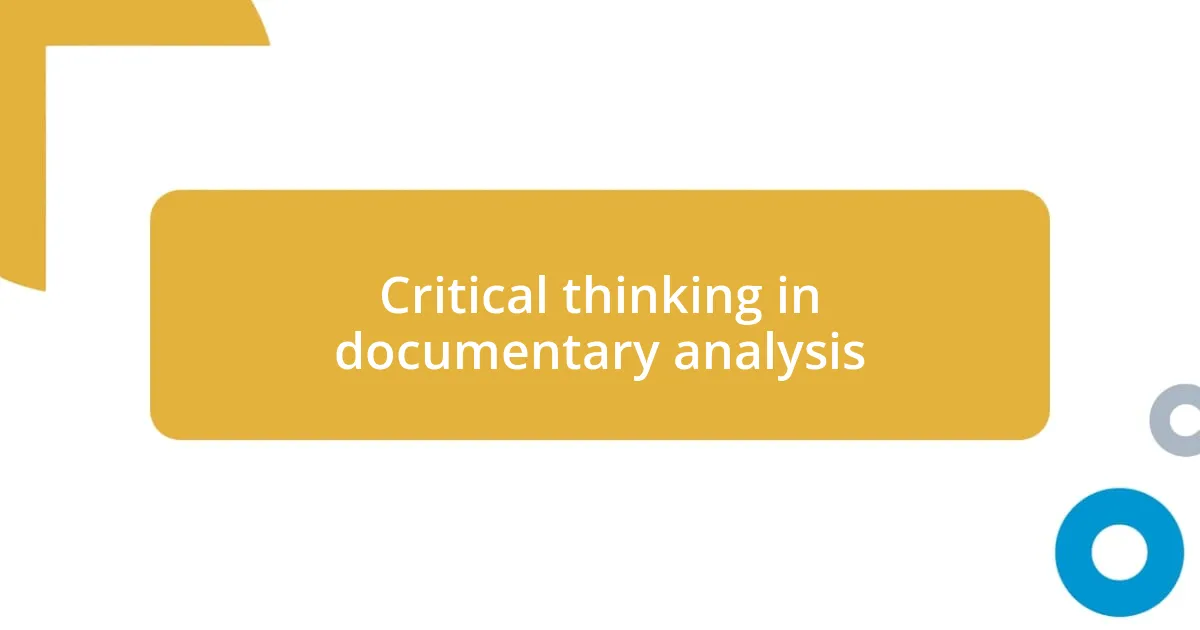
Critical thinking in documentary analysis
Understanding how to analyze historical documentaries requires robust critical thinking skills. I’ve found it invaluable to constantly ask questions while watching. For instance, who’s telling the story? Understanding the perspective of the filmmakers often reveals biases and helps frame the narrative. When I pondered this during a documentary on the Vietnam War, I realized how different the portrayal might be depending on whether the focus was on soldiers, civilians, or politicians.
Another aspect of critical thinking in documentary analysis is distinguishing between fact and interpretation. There are moments, like when watching a documentary on the suffragette movement, where emotional appeals may overshadow factual accuracy. It’s essential to take a step back, analyze the evidence presented, and consider the context—was it genuinely reflective of the overall historical picture or just a captivating story? My approach involves taking notes and comparing different sources, which has deepened my understanding of the complexities involved.
Finally, I believe that engaging with the source material goes beyond merely watching. Reflecting on my personal experiences while viewing these documentaries seriously enriches my critical analysis. For example, thinking about how the emotional relentlessness of a World War I documentary resonated with my own challenges enables me to draw parallels between historical and contemporary struggles. This connection not only sharpens my analysis but also reminds me why it’s crucial to remain inquisitive about the narratives we’re presented with.
| Key Elements | Description |
|---|---|
| Questioning Perspective | Analyzing who tells the story and their potential biases helps frame the narrative effectively. |
| Fact vs. Interpretation | Differentiating emotional appeal from factual accuracy ensures a deeper understanding of historical complexities. |
| Personal Reflection | Connecting personal experiences to documentary content enriches analysis and fosters a more profound engagement with history. |
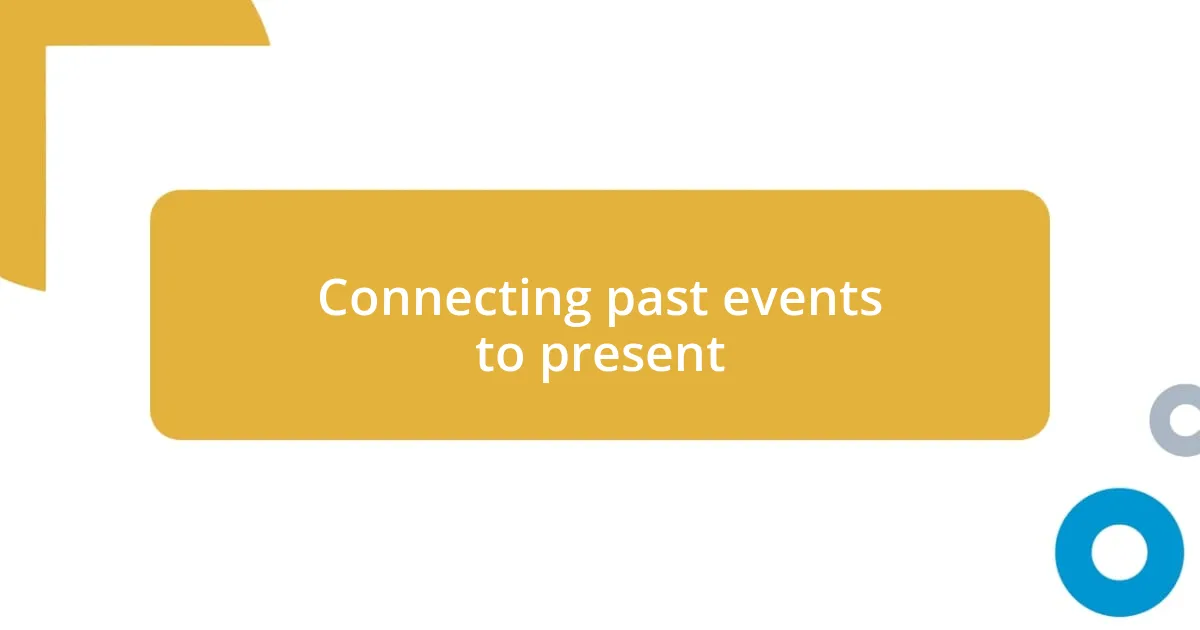
Connecting past events to present
Reflecting on past events often reveals uncomfortable truths about our present. I remember feeling unsettled when a documentary highlighted the systemic racism prevalent in earlier periods; it made me confront similar inequities in today’s society. What does it say about us if we fail to recognize these patterns? It brought home the idea that the shadows of history can linger, challenging us to address them head-on.
In one poignant moment while watching a documentary on the Holocaust, I was struck by the sheer human cost of indifference. Each survivor’s story resonated deeply within me, reminding me that silence in the face of injustice can be as damaging as the injustices themselves. How can we create change if we remain passive? This connection between past atrocities and current human rights challenges underscores the importance of vigilance and activism in our lives today.
The impact of historical narratives doesn’t fade; it transforms. Every documentary I delve into weaves a thread between moments in history and issues we tackle now—from climate change activism echoing the environmental movements of the past to grassroots campaigns drawing inspiration from suffragettes. I can’t help but ponder, how can we harness the lessons learned to shape a more equitable future? This realization fuels my commitment to engage with history actively, as it illuminates pathways forward while urging us to reflect on the choices we make today.
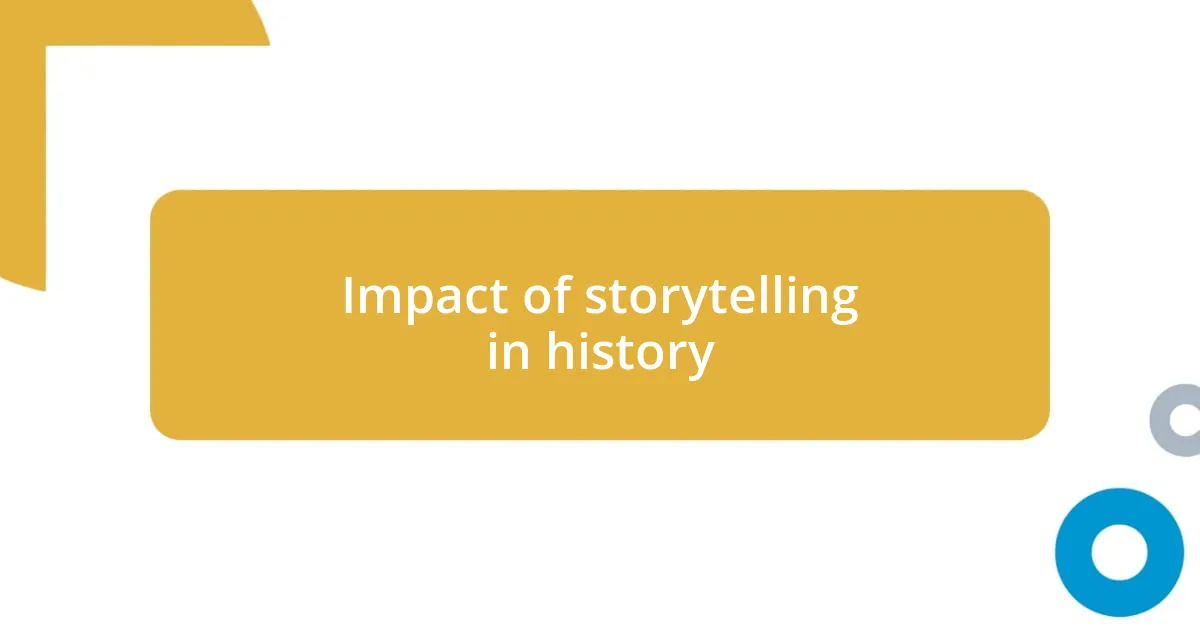
Impact of storytelling in history
Storytelling has an extraordinary power to shape our understanding of history. I remember watching a documentary about the Civil Rights Movement; the way personal testimonies were presented made me feel like I was walking alongside those courageous figures. This emotional connection transformed historical facts into compelling narratives that demand our attention and empathy. Isn’t it fascinating how a well-told story can bring a distant event closer to our hearts?
Moreover, the art of storytelling in documentaries often serves as a bridge between personal experiences and collective memory. I think back to a segment on the fall of the Berlin Wall, where interviews with people from both sides highlighted their hopes and fears. It made me realize that history is not just a series of events; it’s intertwined with human emotions and aspirations. How many of us can relate these stories to our own struggles and triumphs in the fight for freedom?
Lastly, I find that storytelling enriches our critical perspective on historical events, urging us to ask deeper questions. For instance, while watching a documentary that explored colonialism, I couldn’t help but reflect on the privilege I hold today. How does this affect my understanding of ongoing social justice movements? The realization that history is not merely past occurrences, but instead a narrative that continues to shape our society invigorates my desire to engage with history in informed and meaningful ways.
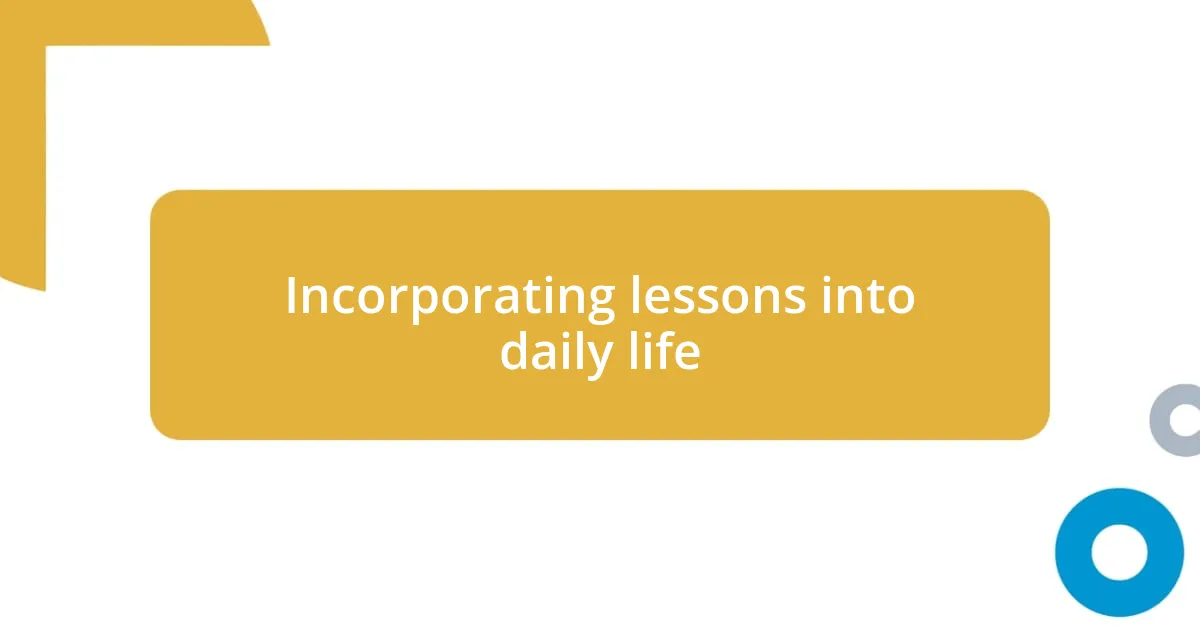
Incorporating lessons into daily life
Incorporating what I’ve learned from historical documentaries into my daily life has become an intentional practice for me. For example, after watching a powerful feature on the women’s suffrage movement, I felt an urgent need to advocate for equality in my community. I started volunteering for local organizations focused on women’s rights, realizing that small actions can collectively move us toward greater change. Isn’t it invigorating to think that my contributions can mirror the resilient spirit of those who fought for a voice?
There’s something profound about taking historical lessons and applying them to modern dilemmas. A while back, after I absorbed a documentary on the Great Depression, I became acutely aware of socioeconomic disparities around me. It inspired me to support local food banks and initiatives aimed at helping those facing hardships today. How often do we take this vital connection for granted? Embracing these lessons has not only deepened my understanding of the past but has also ignited a sense of responsibility to positively impact my surroundings.
Each day presents an opportunity to act thoughtfully based on historical insights. I’ve found that engaging in conversations around social justice, as prompted by the stories I’ve absorbed, empowers others to reflect on their views and actions. One evening, while discussing systemic issues with friends, I saw firsthand how sharing my historical perspective sparked a genuine dialogue. Can you imagine the ripple effect of conversations rooted in learning from the past? It’s these moments that remind me how history isn’t just for studying; it’s for living, shaping, and connecting us all.
